#her hair is glorious !!!!!!!!!!!
Photo

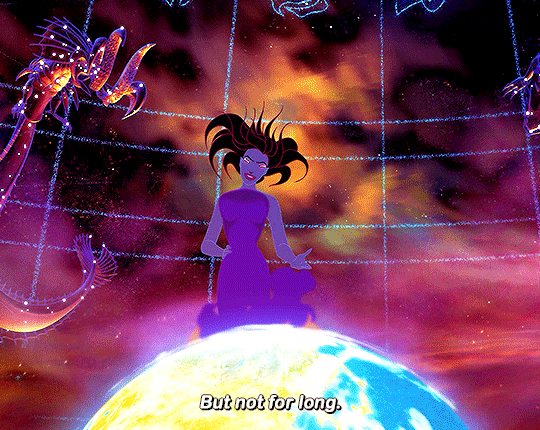

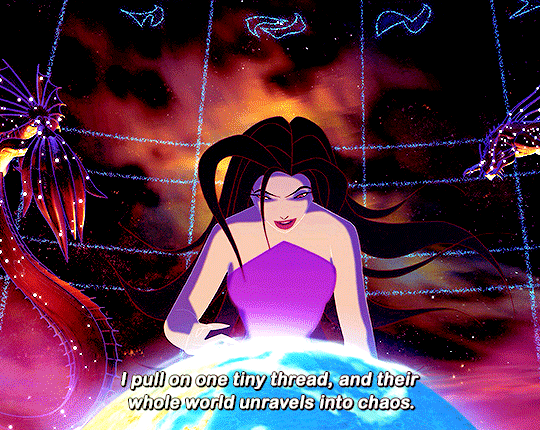

SINBAD: LEGEND OF THE SEVEN SEAS
—2003, dir. Tim Johnson and Patrick Gilmore

#filmedit#sinbad legend of the seven seas 2003#sinbad#sinbadedit#animationsource#animationsdaily#useraashna#useremilia#tvandfilm#gifs*#you know what's glorious? her animated hair
1K notes
·
View notes
Photo




Willow (2022) - 1x01
#willowedit#willow 2022#kit tanthalos#jade claymore#ruby cruz#erin kellyman#tanthamore#willow 1x01#femslash related stuff#just kit casually comforting her gf without making a big deal about it#lol at jade eyeing her hand#btw her hair is glorious!#now that we're this many years from the earlier casting suggestions maybe laura from wicked + the divine?
504 notes
·
View notes
Text
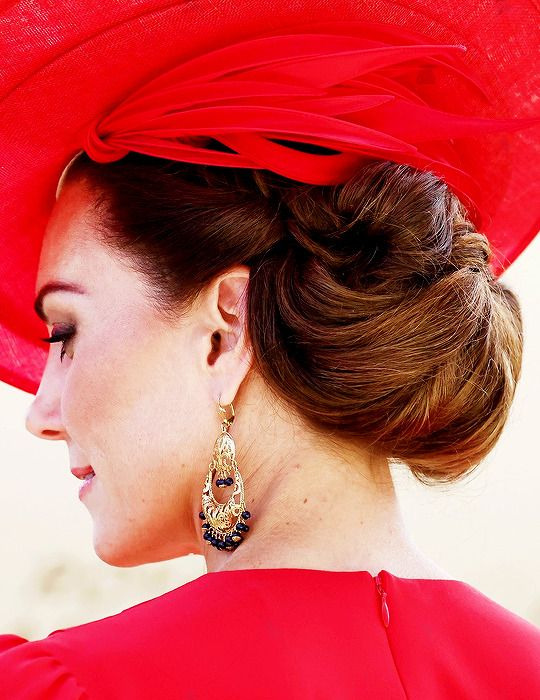
#catherine princess of wales#elegance#style icon#kate middleton#pure beauty#future queen#glorious hair#british royal family#royal family#royal style#british royal fandom#princess kate#royal ascot#the lady in red#red is her color
52 notes
·
View notes
Text
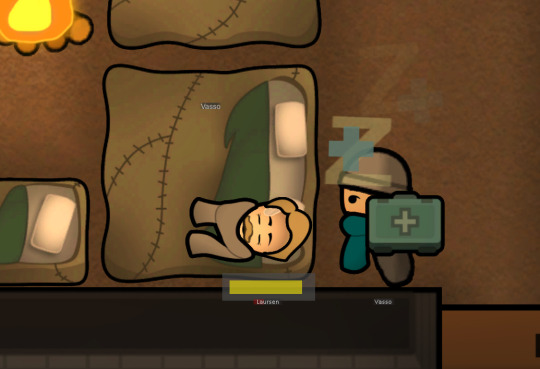
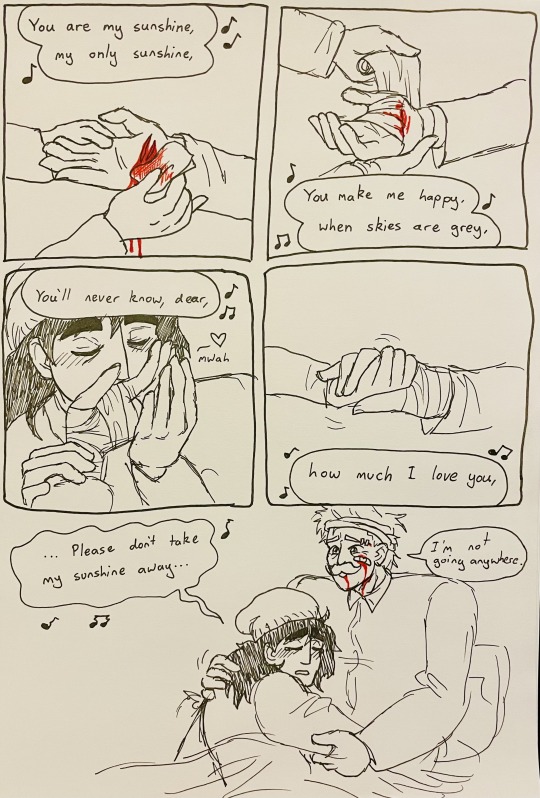
It always breaks my heart a little to watch one half of a couple patch the other half up after a fight- in this case, after an attack of manhunting muffaloes.
Poor Vasso probably finds it incredibly taxing to care for his childhood best friend-turned-husband, but it doesn't stop him from doing an excellent job— he even remembered to kiss it better!
I've also decided that, while he's wearing winter gear, I'm going to indulge myself and draw Vasso with his hair out.

Oh, and Blackdragon lost his right leg to the muffaloes, too. No biggie, Euclid had a prosthetic made for him faster than you can say "If I had a dollar for every time one of my colonists has lost a leg in this run..."
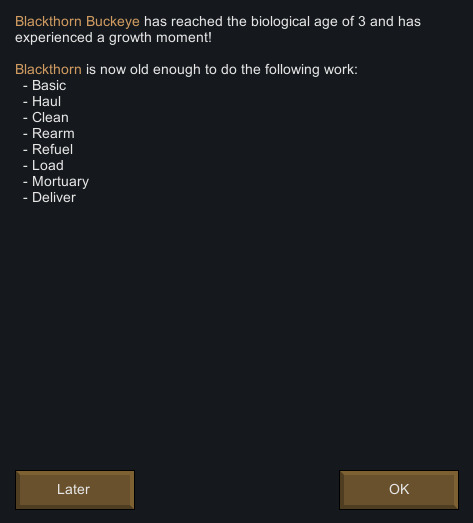
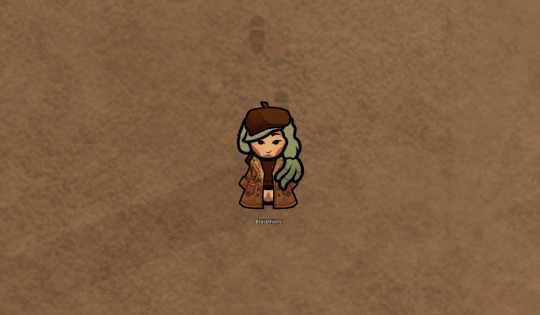
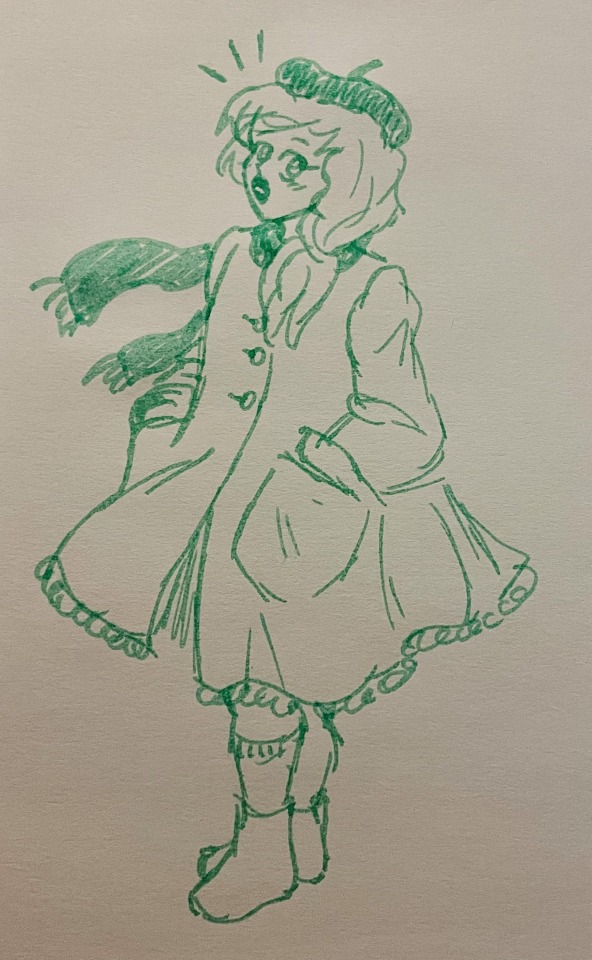
Toddler Blackthorn is now Child Blackthorn, and looks just like her mama <3
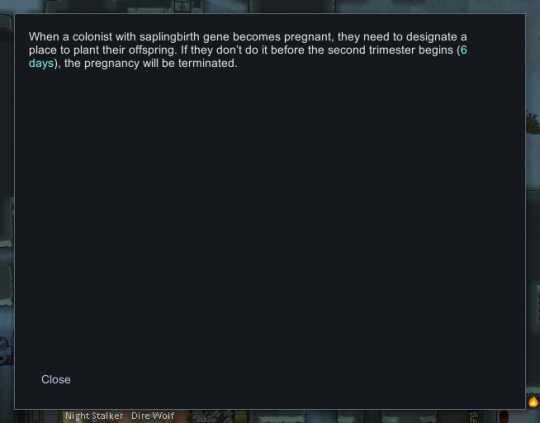
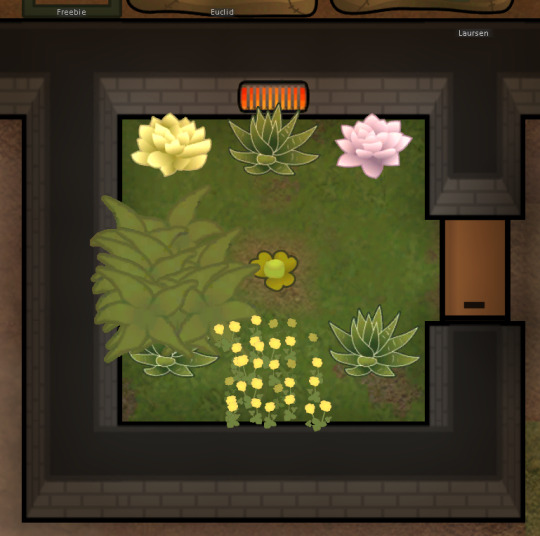
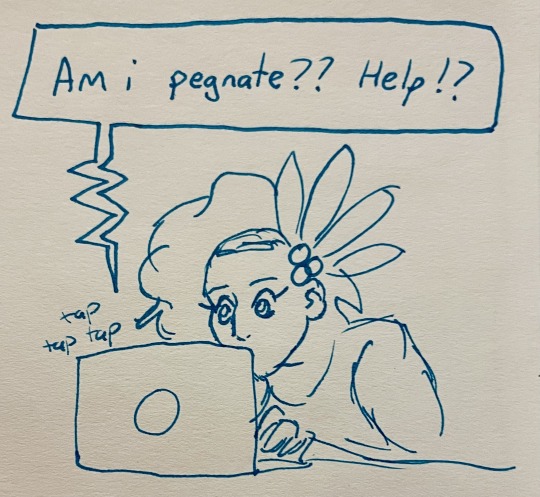
Speaking of mama... Honestly, Buckeye, you're supposed to be an asexual tree person married to a dragon with reduced fertility!! Stop doing this!!
Also, I have made the executive decision that new saplingchild doesn't count as "the next person to come onto the map" and will not be sacrificing her.
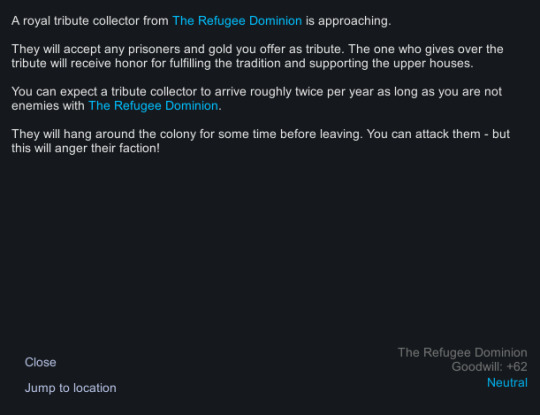

Not to worry, though. We have at last sighted the sacrifice that will earn us our ship!
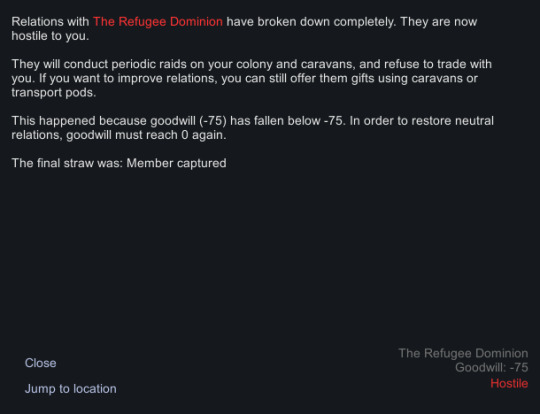
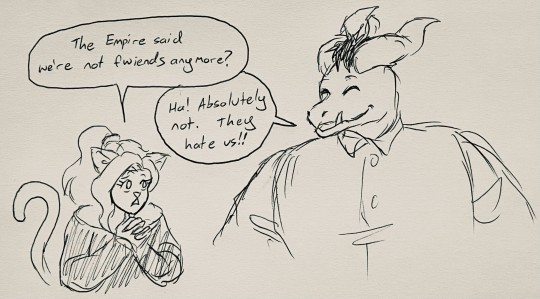
The Empire is none too pleased with our valiant efforts, but they won't be a problem for long. Soon we'll have our ship, paid for in blood!
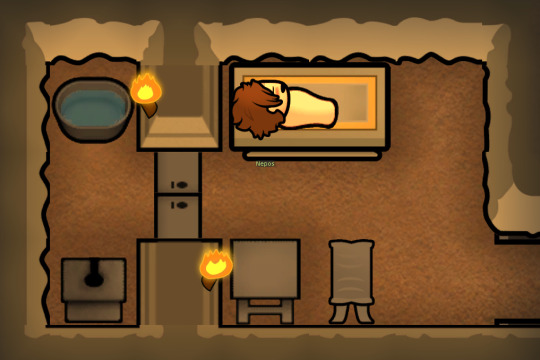
Nepos has no idea what's coming for him...
First | Next | Previous
#rimworld#gracie plays#The Children of Ecthuctu#art#my art#traditional art#rimworld art#unpolished art#Vasso has such glorious hair#He's so pretty#Speaking of pretty#Isn't Blackthorn the cutest lil' thing???#The coat and the beret are so stylish#when's she dropping her winter catalogue??#Buckeye and Magic Man obviously thought she was cute enough that they wanted ANOTHER one#how tf do they expect me to keep a saplingchild alive for thirty days in the tundra?#Oh well#Rip to Nepos and his Empire friends#our food stockpile was dwindling anyway#and at long last#we can acquire our ship!!#have a spectacular day everyone!! <3#tw blood#tw cult
38 notes
·
View notes
Photo


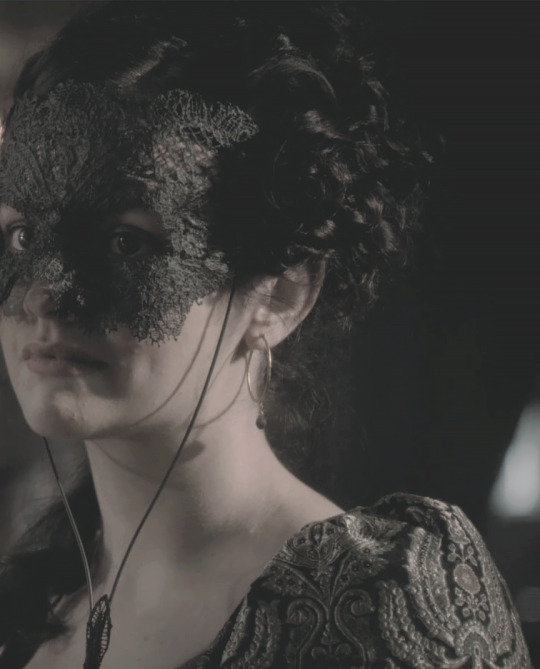



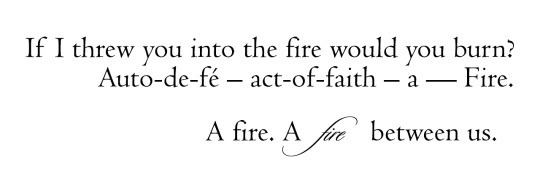

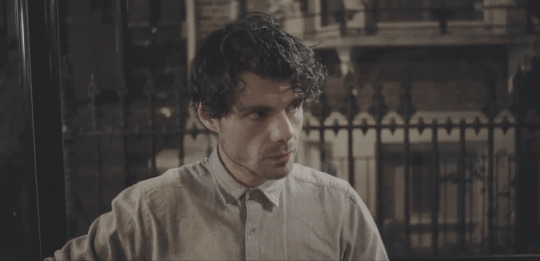

‘rain' (rapa nui) by pablo neruda || ‘wuthering heights’ by emily brontë || ‘desgraciado’ (the collected letters) by angel dominguez || ‘these hands, if not gods’ by natalie diaz
#larys x alicent#larycent#alicent x larys#alicent hightower#larys strong#his dreams are the color of her dress his hands are as red as her hair#sorry guys but it's a hozier song#'don't give it a hand offer it a soul' and 'don't let it in with no intention to keep it'#and 'honey don't feed *the rat alicent!!* it it will come back' and 'you should never know how easy you are to need'#damn now I feel the need to make a thing with 'it will come back' lyrics#the darkest the most poetic the most layered!!!!!!!!!#i'm not even going to tag it as hotedit because it's made for my creepfam and creepfam only#happy holidays to us and a glorious shoutout to matthew needham and that unparalleled brain of his#*kisses his intellectual curls*#shitty things i do for love#game of thrones
101 notes
·
View notes
Text
The Shocking Redemption Arc of Chester Arthur
To my great pleasure, I get to tell you about Chester A. Arthur. If you don’t know his story, that’s a surprising statement, because most people don’t even recognize his name as one of the presidents. That’s a crying shame, because this guy has the most fascinating character arc of any president I’ve come across so far. He entered the presidency as a despicable, corrupt, conniving political lackey, and left it as--
Well, I’d best get on with the story.
Chester Arthur started out as an idealist. He was the son of an abolitionist Baptist minister, and though he dropped the religion in adulthood, he remained devoted to abolishing slavery. He became a lawyer with a New York firm that argued several civil rights case, and he rose to fame in 1854 when he served as the defense attorney for Elizabeth Jennings, the Northern version of Rosa Parks. Arthur’s victory in her case led to the desegregation of New York City’s public transportation.
During the Civil War, Arthur got an appointment as New York’s quartermaster general. After the war, Arthur returned to civilian life and became a Republican “party man” who worked behind the scenes to draw in voters, funding, and supporters. He and his wife Ellen (called Nell) both loved the finer things in life, which drove Arthur to do whatever he could to gain fame, wealth, and social status.
This is where I need to explain the spoils system. For the first hundred-plus years of American politics, all federal positions were filled by appointment. When a new president came into office, he could award government positions to his supporters--"to the victor go the spoils". Federal employees were required to donate money to the ruling party. There were no requirements for education or relevant experience. Any job could be filled by anyone with the right connections. If you think that sounds like a breeding ground for corruption and cronyism, you’d be absolutely right. By the 1870s, the system was getting extremely corrupt, and there was a growing push for reform.
But not by Chester Arthur. He owed his career to the spoils system. Through his work in the party, he became the right-hand man of Roscoe Conkling, New York’s senior senator and the state’s “political boss”. Conkling was a flamboyant showman, a magnetic politician, and a ruthless man. He had been a major supporter of Ulysses S. Grant’s presidential campaign, so Grant gave Conkling control over all the federal appointments in New York. Conkling used his power to fill positions with his friends and supporters, and he was brutal in attacking anyone who got in his way.
Because Chester Arthur was Conkling’s most loyal supporter, he got the best federal job in the country—Controller of the Port of New York. Before income tax, around 60-70% of federal funds came from the tariffs at this one port. The controller got a salary similar to the president’s, plus he was able to take a percentage of all the fines they levied. At the height of his power, Chester Arthur made $50,000 a year, which is a lot when the average skilled worker at the time made $500. (A rough estimate puts his salary at $1.3 million in today’s dollars.)
Arthur was living the high life. He racked up huge tailor bills. He had a gorgeously furnished house. His job allowed him to force his employees to donate a percentage of their salary to the Republican Party, which gave him even more power within the political machine. He bought huge amounts of wine and cigars that he handed out to people he was wining and dining for the good of the party. His wife resented that he was rarely home because of his political work, but Arthur loved the machine too much to stop.
After his 1876 election, President Rutherford B. Hayes desperately tried to reform the spoils system, but was blocked every step of the way by Roscoe Conkling. Finally, in 1878, Hayes managed to remove Arthur from his position as port controller, under suspicion of corruption, which allowed Arthur to spend more time working for New York’s political machine.
In January of 1880, Arthur was in Albany working for a political campaign when his wife caught pneumonia. By the time Arthur got home, Nell had fallen into a coma, and he wasn’t able to speak with her before she died. He felt guilty over her death, and especially the lack of closure caused by his devotion to politics. But instead of changing his ways, Arthur moved in with Conkling and became more devoted to politics than ever.
Which brings us to the 1880 Republican Convention. The Republican Party was split between two warring factions—the Stalwarts like Conkling who wanted to keep things the way they were, and the Half-Breeds who wanted civil service reform. President Hayes refused to seek re-election (partly because Conkling had made his life miserable) so these two factions somehow had to agree on a new candidate. Conkling supported a third term for Ulysses S. Grant. The Half-Breeds supported James G. Blaine of Maine—who happened to be Conkling’s mortal enemy.
James Garfield was there to nominate John Sherman—the Secretary of the Treasury and the younger brother of the famous Civil War general—and I can’t go any further in this story before I tell you a little bit about him. James Garfield is one of the most ridiculous overachievers in the realm of American politics. He was born into a dirt-poor farming family (he’s the last president ever to have been born in a log cabin). At sixteen, he left home to work on a canal boat, but quit after he nearly drowned, and his mother and brother scraped up enough money for him to go to school. His first year, he paid for his tuition by working as a school janitor. His second year, the school hired him to teach six classes (while he was still a student!) and then added two more because of how popular he was. By the time he was twenty-six, he was president of that same school. He became a lawyer and was elected to Ohio’s state legislature. During the Civil War, he became the youngest person to earn the rank of general. While fighting in the Civil War, his friends put his name in as a candidate for the US House of Representatives, and Garfield won even though he refused to campaign. He then served several terms in the House, where he became popular, but he refused to seek the presidency, because he’d watched several friends become warped by their presidential ambitions.
At the 1880 Republican Convention, Garfield was the more popular Ohio candidate, but insisted he was there only to nominate Sherman. At one point in his nominating speech, Garfield asked the audience, “Now, gentleman, what do we want?” To Garfield’s horror, one man shouted, “We want Garfield!”
Garfield remained loyal in nominating Sherman, but the spark had been lit. The voting went round after round after round for two days, with the votes being split between Grant, Blaine, and Sherman, with no one getting enough to win the nomination. Garfield got one vote in the third round. In the thirty-fourth round, Garfield suddenly got seventeen votes. Garfield stood to protest, saying no one had a right to vote for him since he hadn't consented, but the president of the convention--who was secretly thrilled because he liked Garfield more than any of the other candidates--told Garfield to sit down.
By the thirty-sixth vote, Garfield had won the nomination.
Now they had to choose a vice president. Several of the delegates got the idea to throw a bone to Roscoe Conkling. He was furious that Grant had lost the nomination, and he was vindictive. Conkling controlled New York’s political machine, so without him, the Republicans would lose New York, and without New York, they’d lose the election. He had to be placated. So the delegates nominated Chester Arthur, his right-hand man, as vice president.
Conkling told Arthur to refuse the nomination, but Arthur accepted, saying it was a greater honor than he had ever hoped to achieve. That's putting it mildly. The only position he’d ever held was port controller, and he’d been removed from that. Plenty of people thought nominating him was a horrible idea—a man like Chester Arthur only one step away from the presidency? But other people thought it was a shrewd political move—it would placate Conkling’s faction of the party, and Garfield was young and healthy and would rule in a time of peace. It wasn’t like there was any chance he’d die in office.
After Garfield was elected, Arthur immediately started causing problems. He all but openly boasted of buying votes in the election—which was not a great look when it had been a close race. He was completely on Conkling’s side in his war against Garfield. After Garfield appointed Levi Morton, a Stalwart, as Secretary of the Navy, Conkling sent Arthur and another lackey to drag Morton out of his sickbed--forcing him to drink a bracing mixture of quinine and brandy--and bring him to Conkling’s house to get chewed out, which caused Morton to resign. Conkling forced another Stalwart Cabinet nominee to resign on inauguration day.
Then Conkling went to war over the federal appointments. At first, Garfield placated him, appointing several of Conkling’s candidates. But then Garfield nominated Judge Robertson as Port Controller of New York Harbor. Conkling was livid. That was the prime federal position, a major source of Conkling’s power in the party, and Robertson was one of Conkling’s political enemies. In Conkling’s mind, Garfield had stabbed him in the back. Arthur agreed, and openly bad-mouthed the president to the press.
Conkling and the other New York senator resigned their Senate seats in protest—a dramatic political move. In those days, state legislatures voted for senators, and Conkling believed that since he controlled so many New York politicians, they’d easily get re-elected to their old seats. Unfortunately, the legislature was sick of being under Conkling’s thumb. The election became a drawn-out battle, and Chester Arthur went to Albany to help Conkling in his campaign.
While he was there, the unthinkable happened. On July 2, 1881, James Garfield was shot at a train station by Charles Guiteau, an insane office-seeker. Guiteau had come to the White House every day for months seeking an appointment under the spoils system. When that failed, he decided God wanted him to get Garfield out of the way so the spoils system could continue. After he shot the president, Giteau shouted, “I am a Stalwart, and Arthur will be president!”
As you can imagine, that made things really bad for Arthur. He’d just spent months fighting the president tooth and nail, and the assassin had mentioned his name. Plenty of people thought Arthur had something to do with the shooting. He and Conkling both needed police details to protect them from lynch mobs.
Arthur didn’t want to be president; in his mind, vice president was the perfect job—a position with a lot of political leverage, but no responsibility. He went to the White House hoping to convince Garfield that he had nothing to do with the shooting, but the doctors wouldn’t let him in the room. He managed to speak to the First Lady, where he got choked up with emotion and was observed to be in tears. A reporter later found him in the house where he was staying in Washington, and noted he'd obviously been weeping.
To Arthur’s relief, Garfield seemed to get better. The bullet had missed his spinal cord and all his major organs. If he’d been left alone, Garfield would have made a complete recovery. Unfortunately, his doctors repeatedly prodded the bullet wound with unsterilized instruments, and Garfield fell victim to a massive infection. He lingered for months, slowly starving and rotting to death.
Through all this, Arthur stayed in New York and refused to take up presidential duties; with so many people accusing him of the assassination, he didn’t want to make it look like he was preparing to usurp the throne.
It eventually became clear that the assassin had acted alone, which laid the rumors to rest, but no one wanted Arthur to be president. James Garfield had been a man of the people. The working class considered him one of their own, proof that anyone could rise from poverty and become president. He was an idealist, a champion of civil rights, a family man who lived modestly. For the first time since the Civil War, a president had been supported by both the north and the south, and the country had come together in grief. Chester Arthur was Garfield’s exact opposite—a conniving political lackey who’d become a millionaire through corruption.
James Garfield died on September 19th. To the American people, it looked like their worst nightmare had come true. Conkling’s lackey was in the White House, and now Conkling would rule the nation the same way he’d ruled New York.
Yet, to everyone’s surprise, President Chester Arthur became a completely different man. In one of his first speeches, he listed civil service reform as one of his top priorities—a shocking move for a man who’d become president through the spoils system. Soon after Arthur’s inauguration, Conkling demanded he name a new Controller of the Port of New York. Arthur angrily refused and called Conkling’s demand outrageous. Conkling stormed out in fury and never forgave Arthur. (Arthur did later risk his reputation to nominate Conkling for the Supreme Court, but Conkling, ever petty, refused the position.)
Arthur didn’t have a complete personality transplant. He still lived lavishly, hosting lots of state dinners. He still preferred the social duties of the presidency to actual government work, and he was a hopeless procrastinator. Always fastidious, Arthur refused to move in to the rotting, rat-infested White House until they fixed up the dump, and he ran up extravagant bills during the remodel.
Yet, as a president, he was...respectable. He worked for African-American civil rights. He started a major process of rebuilding and reforming the outdated and corrupt navy. He did sign the Chinese Exclusion Act, but he had vetoed an earlier, harsher version and only signed a much-reduced one (that probably would have been voted in anyway if he’d vetoed it). That remodel of the White House, even if it ran over-budget, was long overdue.
Most shocking of all was his unswerving devotion to civil service reform. He continued an investigation into a government postal scandal, even though everyone assumed he’d drop it. He voiced his continuing support for reform efforts. In 1883, Arthur signed the Pendleton Civil Service Reform Act. As written, the act required only 10% of federal jobs to be assigned based on merit, and even that required the president to take action to enforce it. People assumed that Arthur would sit back and do nothing, so the spoils system would remain in place. Yet Arthur immediately formed a commission to enact the reform, even appointing some of his old enemies. The man who’d benefited most from the spoils system became the one to finally destroy it.
How do we explain such a complete and sudden change? Part of it’s a matter of personality. If I can indulge in a bit of meta, Chester Arthur seems to be a textbook example of the sanguine-phlegmatic temperament—someone who wants to fit in with the crowd, to go with the flow. As a political lackey, this made him self-serving and amoral, but as president, the crowd he had to impress was the American people. After months of getting crucified in the press, with tons of articles saying what they didn’t want him to be, he’d have plenty of motivation to become what they did want him to be.
A more important motivation, though, was death. His wife’s death was likely the first shock that would make him step back and take stock of his political career. Garfield’s death had an even more profound influence on him. The spoils system had led a madman to murder a president in Arthur’s name; if anything could motivate a man to change the system, that would be it. Even more profound than that was his own death. Not long after entering the White House, Arthur was diagnosed with a fatal kidney disease. He hid the diagnosis during his term, but his actions in office were the actions of a man doomed to die, with a mind toward the legacy he’d leave behind.
Yet there’s another stranger, more mysterious influence that I’ve left to last because of how cool the story is. The day before his death, Chester Arthur—who’d become ashamed of his old life—asked a friend to burn the vast majority of his papers. Years later, among the papers that had been spared, his grandson uncovered a packet of twenty-three letters from a 31-year-old invalid named Julia Sand. Julia came from a family very interested in politics, and her illness meant that she spent a lot of time reading the newspapers, so she was familiar with Chester Arthur’s political career. In August of 1881, she sent Chester Arthur a letter that began, “The hours of Garfield's life are numbered—before this meets your eye, you may be President. The people are bowed in grief; but—do you realize it?--not so much because he is dying, as because you are his successor.” Over seven pages, Julia scolded Arthur for his corrupt ways, but assured him of her faith in his better nature, and urged him to reform. She sent letters over the next two years, full of encouragement and scolding and political advice. She called herself his “little dwarf”, because her lack of ties to him meant she could be completely honest with him.
There’s no evidence he ever answered her. But she did offer some rather specific political advice that he seems to have followed. And he did visit her once. In 1882, he stopped by her house in the presidential carriage, surprising her and her family (who had no idea she’d been writing to the president) with an hour-long visit. She seemed to grow more frustrated with his lack of answers after that, and no letter exists after 1883.
There’s no way to say what kind of effect the letters had on him. But amid all the turmoil after the assassination, it must have meant something to have one voice saying she believed in him. She was a voice from outside the Washington political machine, who could serve as a sort of conscience. The fact that those letters survived when so much else burned suggests he considered them worth saving.
No matter the reason, the truth remains that Arthur entered the presidency as an example of all that was dirty and loathsome in the political system, and he left it as a respectable man. In giving up his old ways, he sacrificed connections he’d spent years building. His old friends never forgave him, and his old opponents never quite trusted his reform, yet he did what he thought was right even if it meant he stood alone. In summing up his presidency, I don’t think I can do better than contemporary journalist Alexander McClure: “No man ever entered the Presidency so profoundly and widely distrusted as Chester Alan Arthur, and no one ever retired... more generally respected, alike by political friend and foe.” I think that deserves to be remembered.
#history is awesome#presidential talk#i apologize but i really can't see any way to cut this down#i like the detour into garfield's nomination#i can't cut conkling out any more than i have#i can't leave out his wife#i didn't even mention that he was washington's most eligible bachelor during his term but he remained faithful to her memory#or that his sister served as hostess at the white house and helped raise his daughter (who he protected from the press as best he could)#or that he did make a half-hearted attempt to seek re-election so people wouldn't think he was slinking off in disgrace#and there was some support for him#but he didn't mind at all when someone else was nominated because he was dealing with his kidney disease#and he died in 1886#which means he had the shortest post-presidency life of anyone except james k. polk who died three months after leaving office#i did not come into last week thinking that by the end of it i'd have developed a minor specialization#in the presidency of a guy i knew only for his facial hair and his half-verse in the animaniacs song#i didn't even mention the facial hair!#go to wikipedia and see his glorious muttonchops!#say what you will about the victorians but they had wild facial hair game#but anyway here is the life story of my impeccably dressed trash panda son#who is put together on the outside and a mess on the inside#and still manages to maintain a certain dignity despite how pathetic he is#he's a mess of a human being but i love him your honor
31 notes
·
View notes
Text
lest we forget princess ruto was ripped in the original graphics
#ocarina of time#looks at 3d and Warriors look at how they massacred my girl#they made her BLUE#and Smooth#and flipped her fins?? from like a regal almost waistcoat accent to a corset of dubious biological function#it's cause all the later iterations only reference the character art rather than the final designs that were actually used in game#they did it to ganondorf too he lost his piercing eyes glowing with power and expressions and GLORIOUS HAIR#it's all cause the only fully rendered character art piece of him is his child timeline form. his warlock form was only fully depicted in 3d#he lost his arcane pointed ears too
7 notes
·
View notes
Text
Ailani, The Lost Primarch of the Second Legion and Mother of the Imperial Hospitallers
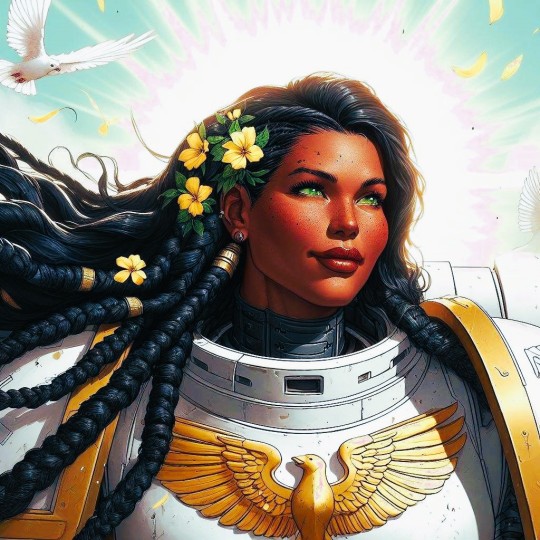
In the annals of Imperial History, there stand heroes greater than any other. These are the Primarchs, the Sons of the Emperor of Mankind, the patriarchs of the Twenty Legions of the Adeptus Astartes who united a frayed and divided galaxy in a long ago age when people still looked to the stars with hope... and the events of the Horus Heresy had not yet doomed the galaxy to darkness, suffering, and despair. But of these, only Eighteen are remembered: The Nine who Turned Traitor, and The Nine Who Remained, steadfast and loyal. Here then is a tale, a tale of the Second Primarch, lost to history and imperial records. It is the tale of Ailani, the Beloved Second, and the Emperor’s Daughter.
Ailani was not like her brothers from the beginning. Beyond the fact that she’d never felt right in her own skin as a child, she had always been a gentle soul.
Cast by warp storms far across the galaxy shortly after her creation, the child then known as “Amanaki” was deposited upon Takiko, an oceanic world dotted with long chains of verdant and mountainous tropical islands, whose vast sea teemed with life on a scale unimaginable. There, the boy was discovered by a young couple, newly married but unable to bear children of their own. Seeing the child from the heavens as a miracle, they adopted the strong lad, who immediately demonstrated a way with resolving disputes and mending broken things, but never seemed quite comfortable with himself. In time, the boy came to understand that “Amanaki��� was not their real name, merely one they had been given by a barely remembered man, the memories lost in shadow and fog, and there was a deeper reason to his unease with his own reflection. Amanaki was encouraged by his parents to cast off the trappings of outward appearances, and embrace his true self — fixing what was broken and settling conflict out in the world was all well and good, but until the inner conflict was resolved and the sense of identity rectified, “Amanaki” would never rise to their full potential. After much soul-searching, reflection, and meditation, Amanaki vanished beneath the expert and caring hands of one of Takiko’s finest healers. Flesh was reshaped, bones restructured, and the boy who’d landed on that world years ago ceased to be, and it was the young woman named Ailani who rose like a phoenix from the metaphorical ashes.
There was awkwardness, at first, but Ailani’s metabolic and psychological gifts as a Primarch made the transition surprisingly natural, if not exactly “easy”, though she did not understand the reasons at the time. Finally herself, Ailani was inspired by the memory of the Healer who helped complete her, and became a healing woman of great repute — indeed, there was none finer on Takiko. Her reputation spread as the woman whose physical labor could heal the body, and her spiritual labor could mend the soul. In addition, her proficiency at conflict mediation only grew with her confidence, and she never lost her love of building and repairing things; it brought her nearly unrivaled joy to see her work bring life and happiness to those around her. In time, she came to be known as “The Saint of Takiko”, the legendary figure who brought peace to the world and united it without ever firing a shot. Unfortunately for Ailani and Takiko, this reputation helped attract the attention of the Emperor of Mankind.
When the Emperor came to Takiko looking for his Warp-Scattered Son, he had not found the man born to lead the Second Legion, but rather he found Ailani, a being worthy only of the Emperor's Scorn, born from Amanaki’s sullied and ruined flesh as the Primarch had embraced her true identity. Ailani did not answer to the name the Emperor called her by. She had not answered to that name since she was a child. When the Emperor cast blame for the "abomination of a Primarch" upon the kindly old man and woman who had been Ailani's parents and lashed out, Ailani met her "father" in battle. He was not prepared for her fury, and while he ultimately emerged victorious, his "daughter", though not a trained warrior like her kin who had been discovered thus far, still managed to have him on the back foot more frequently than he would ever admit. Indeed, the Emperor considered, the wayward Primarch of the Second Legion might actually be worth salvaging. Ailani begrudgingly agreed to return to Terra with the Emperor, but only if he left her family and people alone, a condition the Emperor demurringly agreed to.
Ailani was not a Primarch of a particularly military mind, especially at first, though she brought with her the warrior traditions of her people. First and foremost, she was a healer. With her hands, she mended wounds and repaired cities. With her voice, she mended whole peoples and ended conflicts. When she assumed command of the Second Legion, until then known as the Skybreakers, she was disappointed. There had been no effort to inculcate in them values of construction or nation building. They were a purely destructive force, one who prided themselves on being able to shatter the fighting force of entire worlds with utmost speed and efficiency. Ailani had known war in her time. She understood well enough the value of combat. But, saddled as she was with a Legion who shared the exact opposite of her values, she resolved to teach her errant sons how to be the Builders of Worlds, a marching crusade that strove to create an Empire worth ruling. In time, the Second Legion took a new name, as the Skybreakers became the Imperial Hospitallers, and Ailani became their living standard: her billowing black and braided hair, ornate white and marigold armor with a golden Iwalani, a bird native to Takiko, in place of the Imperial Aquila, and piercing green eyes — stained completely through like emeralds from the omnipresent Ki'ihopna Algae that grew throughout the food on Takiko — causing her to stand out, even among her fellow Primarchs.
Ailani had inherited the Emperor's Optimism, his belief in a better tomorrow and a better mankind worthy of living in it. As her legion spread across the stars, the Hospitallers brought aid to the needy, healing to the sick and injured, and did their best to claim worlds with a mind to preserving or improving the standard of living before they left, but where her brother Lorgar Aurelian dallied as he attempted to spread his doctrine of the Imperial Divinity, Ailani moved quickly. In order to keep a consistent pace and accomplish all her objectives, Ailani divided her Legion into "Cohorts'' who would move in a staggered deployment. These cohorts were named in accordance with the seafaring and island-dwelling culture Ailani had come from: the Maka Ihe, the Vanguard Cohort, would take a world, and begin restructuring and rebuilding according to the rules of Imperial Compliance as well as Ailani’s own personal values. As the Vanguard Cohort transitioned to Worldbuilding, the troops would be able to rest, and were reclassified as "Pa’a", or "Stabilizers", and in turn, "Kūkulu ʻāina" — "Constructors" — as rehabilitation of the world entered its final stages. By the time a Vanguard Cohort had transitioned to Constructors, the Constructors of a previous world had emerged rested and ready for a new bout of combat, and would transition back to Vanguard status as they moved to a new world to continue the Great Crusade.
Ailani may not have been initially well received by her legion owing to her non-military bearing and her clashing values with the Skybreakers, but upon seeing her patience and care for every soul under her command, her Legion gradually became quite taken with her beauty, iron will, silken compassion, and her steadfast and unwavering loyalty to her legion and the worlds they had taken and rebuilt. It was said that she possessed the beauty of Fulgrim, Vulkan's compassion, the high-minded ideals of Sanguinius, Rogal Dorn’s command at construction, and Roboute Guilliman’s administrative prowess, even if she did not excel quite as much as her brothers in any of these individual qualities. Regardless of the degree of truth to this reputation, she made easy friends with several of her kin, most notably Horus, Sanguinius, Fulgrim, and Vulkan, and less easy but still strong friendships with Lorgar Aurelian, with whom Ailani deeply enjoyed discussing matters of philosophy, even if she found his religious zealotry more than a little grating, and Konrad Kurze and Angron, with the two tormented Primarchs able to take much comfort in her soothing presence and healing words. Perhaps then, Ailani was simply too good, too pure, for a growing and changing Imperium, as those qualities which made her among the best of the Primarchs increasingly brought her into ideological conflict with the Emperor.
Ailani had never held the best of opinions of her “father”, as for all his psychic charm and honeyed words that he carefully and deliberately loaded with the ideals she valued, she’d seen a glimpse of his true character when he’d first come to Takiko: an arrogant and egotistical megalomaniac, a man who was obsessed with being God but demanded his followers not call him that out of an enforced and self-serving modesty, and a man who made little effort to hide how much he despised her for “ruining his hard work” by embracing her true self and taking her own name. It was obvious to her that he only tolerated her “aberration” because she had too many useful talents and, as a Primarch, she would be too difficult to replace. While he had been true to his word and had not harmed her family or her people, he had left a garrison of the War Hounds, now known as the World Eaters, nearby to "protect” Takiko ever since he took her with him back to Terra. The implied threat had never been lost on the Primarch of the Second Legion, and deep down, her gentle heart boiled at the Emperor’s audacity, and this set the stage for her Legion’s disappearance.
While neither the fastest Legion nor the slowest, the Imperial Hospitallers had conquered hundreds of worlds, and built glittering gems of civilization as they passed. The Emperor should have been proud. Instead, he saw in Ailani’s planetary reconstructions and rehabilitations an act of defiance. Whether he saw rightly or not is both unremembered and unimportant, but it was certainly true that Ailani never truly believed in him or his cause, and resented him for holding her world hostage to ensure her continued compliance. Her protests, however, had fallen among deaf ears among the Primarchs, with the sole exception of the Eleventh — ironic as the two had seldom seen particularly eye to eye on much of anything. For all her Brothers’ best qualities, too few of them shared in her grievances, and those who did were either unable or unwilling to help her do anything about it. As her quiet resentment of the Emperor simmered, her growing unwillingness to see Takiko continued to be held hostage any longer sparked a notion in her that she knew could split the fledgling Imperium in two: Takiko would secede from the Imperium, and with the might and expertise of the Imperial Hospitallers, it just might manage it.
Outwardly, the Hospitallers continued with their role in the Great Crusade, but their pace began to slow as Ailani started recalling veteran soldiers off the lines and put much greater emphasis on letting younger, less experienced Marines carry the Legion’s role. This roughly coincided with the Eleventh Legion doing the same, with the two Legions gradually building up an elite fighting force of their most capable soldiers, ready for the order to be given. For Ailani, these veterans were chosen with preferential favor given to survivors from the Legion’s days as the Skybreakers — these old soldiers carried skills and experience she would need if her plan to save her homeworld from the Emperor’s callousness and ego was to succeed.
Some unknown period of time before the Horus Heresy, the moment came, and the order was given. The Saint of Takiko returned to her homeworld, and made a decision she could never undo: she ordered the Imperial Hospitallers to fire upon the World Eaters garrison. Veteran blitzkrieg warriors from the old Skybreakers legion formed a spearhead that cut through the World Eaters ranks with ease, using their skills and capitalizing on the confusion to force the World Eaters to retreat through the Warp. The time Ailani had won would only be a few weeks before the Imperium heard what she’d done. Perhaps it would be another few weeks before the inevitable retaliation arrived. Her time was short, and so was Takiko’s. She, and her people, needed to be elsewhere when the hammer dropped, not an easy task with the ships available. As she bade her people to take only what was necessary as she evacuated the planet, word arrived from the Eleventh Legion: they had failed in their course to affect the same strategem. A small delay had snowballed into a far greater failure, and the Eleventh had lost all that he’d cherished at the hands of the Space Wolves Legion. While Ailani’s heart wept for her Brother’s incredible loss, she was gladdened by his arrival with what remained of his Legion at Takiko.
With the newly arrived ships, she had all that she needed to save her people, and for his part, the Eleventh Primarch was glad to assist as it gave a silver lining to his own failure. Millions of civilians boarded Second Legion ships that were too on edge, and Eleventh Legion ships that were too empty. By the time the Imperial response came, with a furious Emperor sending the Night Lords and the World Eaters to make an example of the two rebellious Legions, Takiko was empty, and the Legions were long gone. In a petty rage, the Emperor had the World Eaters and Night Lords glass the world, before the Emperor himself used his psychic powers to cast Takiko’s twin moons at the planet’s surface, pulverizing it into mere rubble. The Emperor's rage was perhaps not entirely misunderstandable; after all, never before had a Primarch disobeyed him. Never before had a Primarch rebelled against his authority. Little did he know, though this was the first time, it would not be the last, and the worst was soon to come for him and his fledgling Imperium.
The Imperial Records would be wiped immediately after. The statues of the Two Rebellious Primarchs were removed from their plinths on Terra. The Emperor, in his rage, psychically wiped all knowledge of the Second and Eleventh Legions and their Primarchs. Even the other Primarchs were forced to forget, but there was no covering up the hole made by Ailani’s absence; without her to discourage Lorgar Aurelian’s zealotry, he became more vulnerable to Erebus’ manipulations and the psychological predations of the Ruinous Powers. Without her soothing presence and calming words, Angron and Kurze began to grow less stable. Without the Saint of Takiko, the Imperium may have lost its last, best chance at avoiding the Horus Heresy only a few centuries later.
As for Ailani and her legion, their status is completely unknown. Few can even infer that a Second Legion once existed, and fewer still know anything of it beyond that, so complete was the Emperor’s purge of the records and the Imperium’s post-heresy suppression of reason and critical thought. But, even in the grim and the dark of the 42nd millennium, from worlds where all hope seemed lost in the face of certain doom, reports occasionally arrive at the Inquisition... reports detailing the arrival of unidentified Space Marines clad in archaic white and marigold armor, and bearing an unusual standard and livery not documented anywhere. These marines vanish as quickly as they arrive, saving the people and then departing on courses unknown.
Perhaps, just perhaps, Lady Ailani is not quite finished with her Crusade just yet.
#hopefully I didn't do the Polynesian elements in a horribly offensive way because that's the last thing I want#Yes this is a spiffing reboot of Branwen Kolodovek. I made her Polynesian because One More White Primarch is not as visually interesting.#Besides -- the Primarchs already HAVE a Glorious Golden Haired Pretty One.#His name is Sanguinius.#Also the potential of Polynesian Space Marines is untapped.#Imagine a legion of those bad boys doing the Ha‘akoa before sending you to meet your maker. You'd be shitting bricks.#We've got Viking Marines and Mongol Marines#We've got Cyborg Marines and vaguely Roman-coded Marines#Sorceror Marines and Vampire Pretty Boy Marines#Druggie Edgy Boi Marines and Hyper Goth Unhinged Punisher Marines#We even got Marines that look like Coal#(love you Salamandies)#Why not Polynesian Marines?#Original tags to follow.#I want a female Primarch#And if the Neckbeards are gonna push and say “WELL ACKSHUALLY PRIMARCHS HAVE TO BE MALE BECAUSE LORE SAYS SO”#Okay then. Have it your way ye chronic Redditors.#I shall give you your lore point.#And now I shall have a Female Primarch anyway who now gets to say#TRANS RIGHTS#YA FUCKING HERETICS#my ocs#warhammer 40000#my oc stuff#warhammer 40k#wh40k#fanon Primarch#fanon Space Marine Legion#Lost Legions#Second Primarch
11 notes
·
View notes
Text
every time shes drawn with big curly hair an angel is born
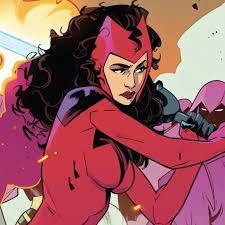
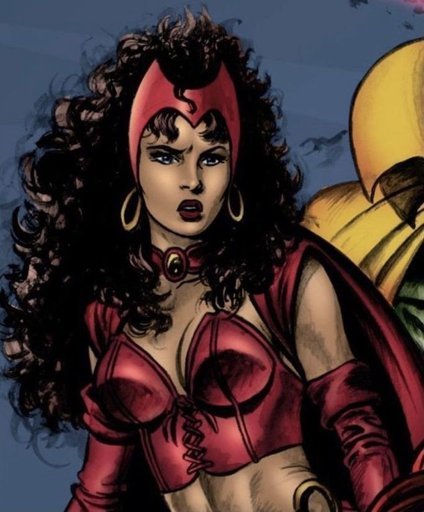

#ramblings#i love you wanda django maximoff i love you#look there were . problems . with her depiction in the uh . was it 1998 avengers run ?#but her hair . it was glorious .
4 notes
·
View notes
Text
today is a good day and I'm not taking any criticism at this time
#im wearing the best shirt evee#my drawing tablet is coming in sometime today#my hair is brushed and i have a little bow because i can#my platonic soulmate ADORED her early Christmas present (thats a fic and ill be posting it in a minute)#i have apple juice#i slept well last night#the person we were going to meet wasnt there so we dont have to go anywhere#i got obsidian in my rock advent calender (a wee bit overtumbled but still cool)#its a glorious day and im going to have chocolate for lunch
3 notes
·
View notes
Text
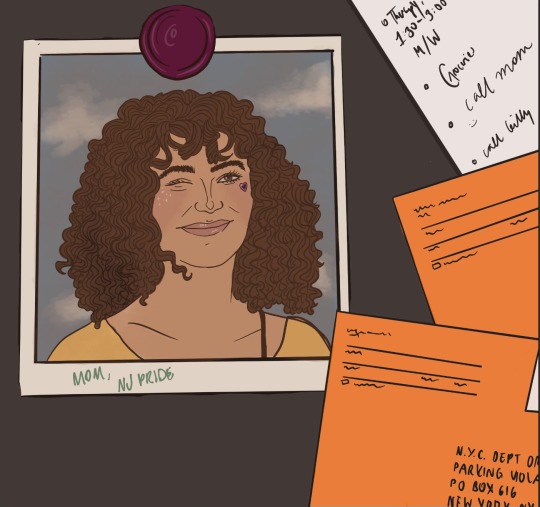
a portrait of tommy shepherd’s refrigerator 💗💜💙 (click for better quality)

#started out as a ‘oh i should do something cute for pride’ and i ended up here.#lil bi wanda at pride on her son-not-son’s fridge! happy june!#i also think he racks up an insane amount of parking tickets. actually do we think he drives#hmm#anyways#mine#my art#wanda django maximoff#marvel#marvel fanart#tommy shepherd#sorry if that’s a misleading tag#oh yeah wanda’s based on gratiela brancusi in this. mostly because of her absolutely glorious hair
61 notes
·
View notes
Text


#kate middleton#catherine middleton#duchess of cambridge#catherine princess of wales#her royal highness#elegance#graceful#natural beauty#royal style#british royal family#british royal fandom#princess kate#glorious hair
44 notes
·
View notes
Text
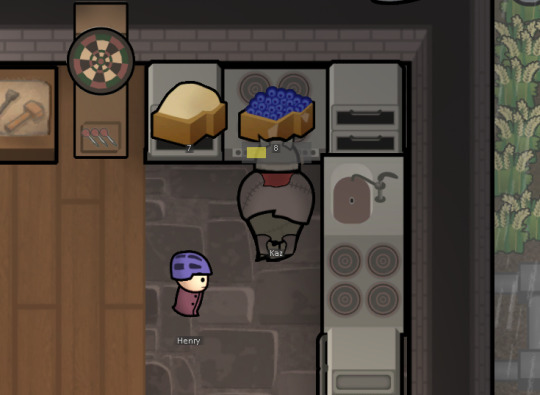

Henry has been following people around to watch them work all day, it's very sweet. He started by hanging out with Wookshys on the fishing bridge but got bored quickly and decided to trot around after Kaz like a little duckling instead.

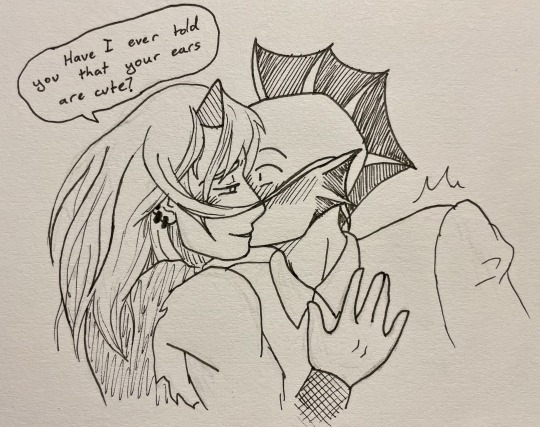

Stared at this message for a few long minutes trying to work out how on earth Zonovo managed to "tuck a loose strand of hair" behind Baz's ear when Baz does not have hair. Eventually, I came to the conclusion that Zonovo tucked a strand of Zonovo's hair behind Baz's ear, and I could never resist drawing Zonovo with his hair down, so here you go.
Also loved that their smooches were immediately followed by a deep talk about death. Ah, romance...

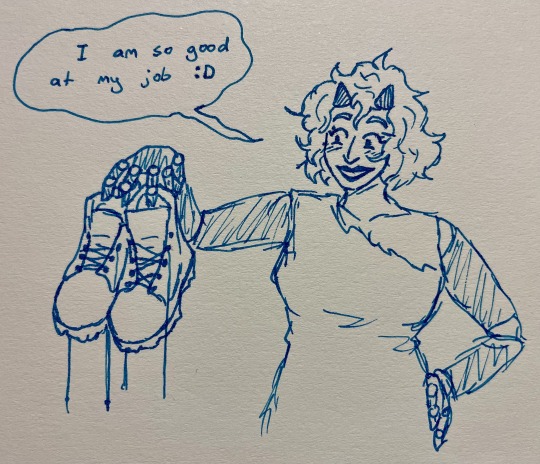
Fafo is such a wonderful colonist to have. She's very talented, and I appreciate her a lot. Connie has been upset that her shoes are tattered, so maybe a pair of masterwork boots will make her stop complaining.

Then this happened, which was weird for a bunch of reasons, mostly because Andy is three and also we have no beer in the colony. Nothing actually happened after this notification- Kaz continued cooking, and Andy continued playing with the Comms Console.
The only person affected by this at all, in fact, seems to be Fafo, who now has a "jealous" mood debuff because Kaz was hanging out with someone else (even though he wasn't). I guess the pregnancy is taking its toll on her, poor thing.
First | Next | Previous
#rimworld#gracie plays#The Animist Alliance#art#my art#traditional art#rimworld art#unpolished art#Henry has put on a helmet and now Connie doesn't hate him#Well aside from the fact that he dares to have recreation time#She wants all the children to be assigned to hard labor#Her religion is weird#Zonovo and Baz continue to be very cute#I'm temped to change Zonovo's hair at the styling station#Any excuse to draw him with long loose hair more often#Though I risk getting him mixed up with Kaz if I do that#Too many impid colonists with glorious long sandy-blonde hair in this colony#Not that I'm complaining mind#I love my pretty impid boys#Anyhoo have a lovely day everyone! <3
33 notes
·
View notes
Text
probs won't hit post limit bc i spent a good chunk of the day watching smallville
#my currently smallville thoughts as of getting halfway thru s5:#jensen's character is dead and gone rip jason teague#also he turned out to be working with his evil mom and held my girl martha and jonathan hostage. so not too sad to see his character go lol#chloe is still getting on my nerves but a little bit less#she seems to have finally accepted her role as sidekick friend who will never be the Love Interest#lois continues to grow on me<3 the 'i barely (but fondly) tolerate you' friendship she and clark have rn is cute#CLARK AND LANA DATING FOR REALS THIS TIME. my shipper heart soars. soaking it all up bc i knowww it will not last </3#also them being each other's firsts. cute and also. VINDICATION. it's just simply what's meant to be. that's his first love ok#clark and lex's rapidly deteriorating friendship in s5 breaks my goddamn heart tho. also lex suddenly interested in lana like. no dude stop#like. i can only get one of my two favorite clark relationships to be afloat at a time. i get a clark x lana win this seasons#only to lose clark and lex :(#my girl martha continues to slay. all the awards to annette o'toole. literally every scene she's in just banger#and lionel's glorious hair finally back. we just love lionel in general. a fun bad dad. it's the flair for dramatics that makes him so fun#also just john glover is constantly slaying every scene too#smallville watch
4 notes
·
View notes
Note
Pls encourage me to quit the job thats been making me miserable for the last 4 months PLEASE I have corporate guilt
QUIT THAT JOB!!!
Your mental health and well being is so much more important than a job. If you are having to force yourself to go there each day, the idea of being there makes you anxious or stressed, you will only make yourself more and more miserable. If you already hate it, it will likely not get better. There are so many more jobs available, better workplaces etc.
I get the guilt. I get feeling sad to leave amazing colleagues. But it is YOUR life. You need to do what is right for you. I get that job hunting SUCKS. I get that interviews are horrid things to experience and personal statements should burn in hell. It is hard. You are spending the bulk of your week in your workplace. You give up most of your life and time to a job so you deserve to be happy (or at least not miserable) whilst doing it.
Please let me know what your next steps involve anon!
#anon asks#my old job i ended up losing a lot of hair and i was so stressed#and then when i got a new job and had to hand my notice in i was fucking terrified#i was like sweating buckets to give it to my boss#because it blindsided her#she didn't realise i was miserable#because all that stress was coming from her#but you know what that sense of relief after i had handed it in#GLORIOUS
16 notes
·
View notes
Text
because some galaxy brain on my uquiz pointed it out and I had never realised before: Here's something for you twilight fans

[Image description: uquiz free answer box filled out: "there is a painting called vampire? by a guy named edward? edward munch? in this painting (edward cullen) a vampire (munches) bites someone’s neck? edward munches? a painting by edward munch? god i fucking love the universe" description end]
btw this is the painting in question:

Okay, some extra info for whoever is actually curious about it:
The painter was called Edvard Munch (pronounced something like "Mounk" I think?) so not really Edward nor munching. He lived in Norway and is best known for his painting "The Scream", that's where you might recognise the name from:

Munch painted a whole series of relationship images, for example "The kiss" where the two faces literally melt together:
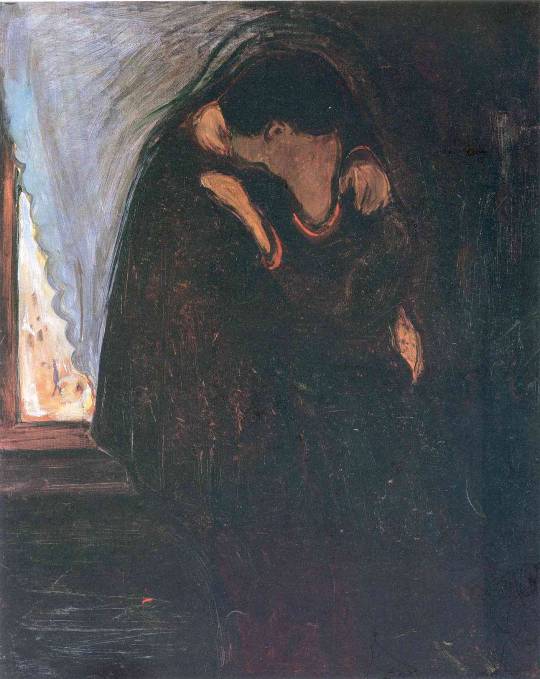
But also just a number of other relationship topics, most of them sad like separation or death.
The "Vampire" painting was meant to belong to that series and originally had a fitting name. I think it was "Grief and Comfort" or something along those lines and the man was supposed to be desperate about something and the woman would shelter him with her hair and comfort and protect. But once the painting was done, someone pointed out that it looked more like a vampire devouring their prey and so the name changed.
And I love it all the more for it.
#edvard munch#vampire#twilight#also her hair is just glorious#easily my favourite painting of munch's#I hope it's okay to share the answer box like that#but the content is not too personal so I hope it's okay#and I just love that observation
10 notes
·
View notes